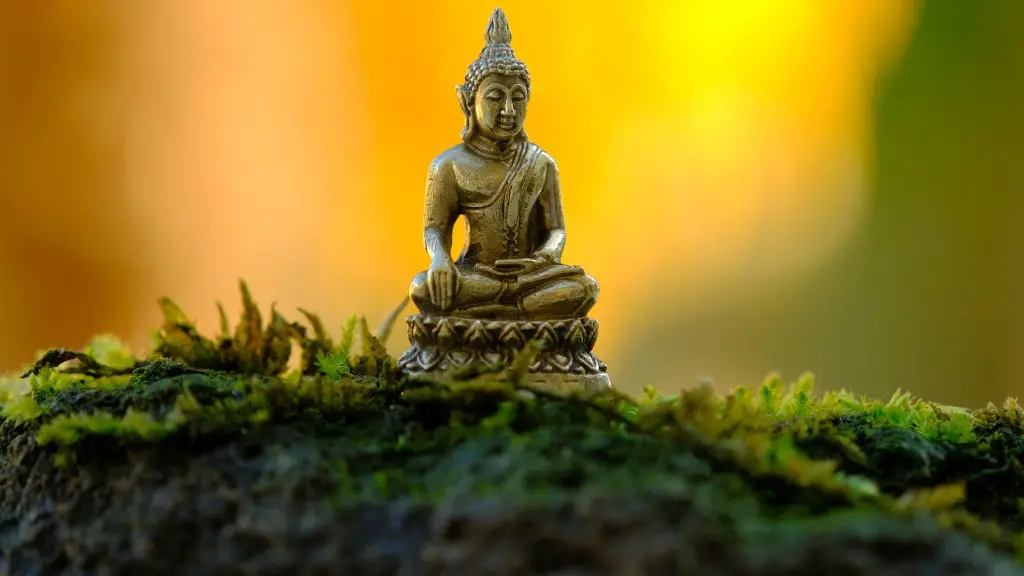Overview
Buddhism and Hinduism are two of the oldest religions known to man. Both originated in India, where Buddhism was founded in the 6th century BC, while the Hindu faith dates back much further, with its roots stretching back to the Indus Valley Civilization. Both Buddhism and Hinduism have a strong tradition of philosophical inquiry, spiritual practice and a belief in some form of reincarnation. Buddhism and Hinduism have many similarities, but they also differ in some ways as well.
Similarities
Both Buddhism and Hinduism believe in reincarnation, or the cycle of rebirth. According to these religions, the soul is reborn again and again, until it is freed from its cycle of reincarnation. Buddhism and Hinduism also both have faith in karma, the law of cause and effect in which positive and negative actions will lead to either positive or negative results in future lives. The two religions also believe in supernatural forces and a higher power, and both have a deep respect for the power of meditation.
Differences
There are many differences between Buddhism and Hinduism. One of the biggest is their origin. Buddhism was founded by Siddhartha Gautama, while Hinduism emerged from a culture and its religious traditions. Furthermore, while Hinduism is the majority religion of India, Buddhism is a minority religion in many countries, particularly in South East Asia. In terms of belief, Hinduism is polytheistic, while Buddhism is a nontheistic religious system. Buddhism has no gods or goddesses, while Hinduism believes in a pantheon of gods and goddesses. Unlike Hinduism, Buddhism is not associated with any particular social class, and there is no connection between its religious practices and caste systems.
Teachings
The teachings of both Buddhism and Hinduism are based on moral and spiritual principles. Buddhism places emphasis on the Four Noble Truths, which are the Truth of Suffering, the Cause of Suffering, the End of Suffering, and the Path to the End of Suffering. Hinduism, on the other hand, is focused on Dharma, which is the path of righteousness. Dharma is based on the Vedas and Upanishads, which provide instruction on living a spiritually fulfilling life. Additionally, Buddhism focuses on cultivating wisdom and understanding, while Hinduism emphasizes performing rituals and worshiping deities.
Practices
Buddhism and Hinduism have different practices, though there is some overlap between the two. In Buddhism, the most common practice is meditation. Buddhists believe that through meditation, one can become more aware and enlightened, and eventually attain Nirvana. In Hinduism, the most common practice is puja, which is a complex ritual performed as homage to a deity. Additionally, Yoga, which combines spiritual and physical practice, is another popular practice among Hindus. Sacred mantras, chants, and pilgrimages are also common in the Hindu faith.
Religious Texts
Both Buddhism and Hinduism have religious texts that contain teachings and stories about their history, beliefs and practices. For Buddhism, the main text is called the Tripitaka, which contains the teachings of the Buddha. In Hinduism, the main text is the Vedas, which are a collection of hymns, rituals, and commentaries that date back to 1500 BC. Additionally, the Upanishads are a collection of scriptures within the Vedas that focus on spiritual wisdom, which is believed to be essential for delivering a person out of the cycle of rebirth.
Impact in Modern Life
Both Buddhism and Hinduism have had an impact on the lives of many in the modern world. Buddhism has a strong tradition of meditation and mindfulness, which has been embraced by many in the west as a way to relax and reduce stress. Hinduism has had an influence on modern society through its teachings on karma, which has taken root in the west as a way to think about the choices and actions that people make in their lives. Additionally, the Hindu deity Ganesh is seen as a symbol of luck in many parts of the world.
Influence on Other Religions
Buddhism and Hinduism have both had an influence on other religions. Buddhism has had an influence on Taoism, a philosophical and religious tradition of Chinese origin, while Hinduism has had an influence on Jainism and Sikhism, two Indian spiritual traditions. Additionally, both Buddhism and Hinduism have been influential in the development of the New Age movement, which draws on a variety of ancient traditions and beliefs.
Habitat Conservation
Buddhism and Hinduism have also had an influence on conservation efforts. Buddhism emphasizes the need for respect for all life and the need to avoid needless destruction. Hinduism has a strong value of harmony with nature, as well as the need to share resources in balance with other life. Both religions have had an influence on the actions of many who are involved in conservation, inspiring them to take action to preserve habitats, protect species, and reduce pollution.
Political Influence
Buddhism and Hinduism have also had an influence on politics. In many Asian countries, Buddhist and Hindu beliefs have been used to justify a variety of policies, including restrictions on religious freedom, the control of foreign aid, and the institutionalization of laws that favor the majority religious tradition. Additionally, some governments, such as in India and Sri Lanka, have used Buddhist and Hindu values to inform their foreign policy and their relationship with other countries.
Impact on Art and Culture
Buddhism and Hinduism have had a strong influence on world culture. Buddhism and Hinduism have both left a strong mark on art, architecture, and literature. Many famous works of art, such as statues and carvings, have been inspired by important figures in Buddhism and Hinduism, such as Gautama Buddha, Shiva, and Vishnu. Additionally, Hinduism and Buddhism have both been important influences on traditional music, such as sitar music in India and various styles of Buddhist chanting.
